Entertainment
Is Noah Centineo Playing Rambo? What to Know About the Prequel
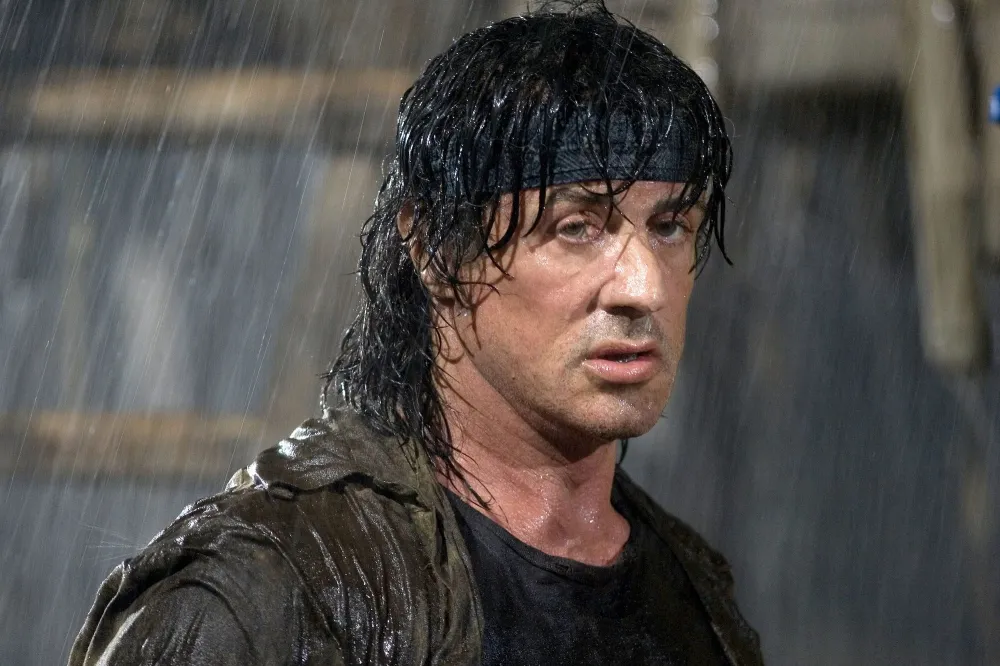
Noah Centineo is headed to the jungle in a prequel to Sylvester Stallone’s classic Rambo action movie franchise.
The To All the Boys actor will do more kicking than kissing as he plays the young version of Green Berets soldier John Rambo, who first appeared in author David Morrell’s 1972 novel, First Blood, and was played by Stallone in five blockbuster movies. Jalmari Helander — the director behind groundbreaking action hit Sisu — was hired by producers Millennium Media in March 2025 to bring an origin story by Black Adam writers Rory Haines and Sohrab Noshirvani to life.
“When I was 11, I saw First Blood for the first time, and it changed my life,” Helander said in January 2026. “Rambo wasn’t just a film to me — it stayed with me growing up and was a defining influence on why I wanted to become a filmmaker. As we begin production on the origin of John Rambo, we’re going back to the beginning.”
The filmmaker went on, “This is Rambo stripped down, raw and real — a survival story about endurance, persistence and lost innocence. It’s an honor to shape this next chapter with deep respect for the character and the legacy, and to bring audiences the start of John Rambo’s journey.”
Keep scrolling for more information about John Rambo below.
Who Is Starring in ‘John Rambo’?
Noah Centineo leads the cast of John Rambo as the young version of the military hero played by Sylvester Stallone in five previous movies.
While Centineo is best known for his rom-coms To All the Boys I’ve Loved Before and The Perfect Date, he portrayed a Navy SEAL in 2025’s Warfare and will next battle M. Bison’s forces of evil as Ken Masters in the upcoming Street Fighter reboot.
The Hollywood Reporter revealed in January 2026 that Centineo will share the screen with Sinners star Yao, Quincy Isaiah (Winning Time: The Rise of the Lakers Dynasty), Jason Tobin (F9), Jefferson White (Yellowstone) and Tayme Thapthimthong (The White Lotus). Their roles will be disclosed at a later date.
What Do We Know About the ‘John Rambo’ Plot?
John Rambo is set several years before the original First Blood novel and its 1982 movie adaptation starring Sylvester Stallone. First Blood takes place in the aftermath of Rambo returning home from the Vietnam War, so the prequel will naturally explore his wartime exploits.
In November 2025, John Rambo director Jalmari Helander addressed the ways his prequel will differ from other entries in the franchise.
“Of course, it’s different, because we’re gonna start in a place where everything is basically pretty okay for Rambo,” Helander told GamesRadar+. “He’s happy and younger and all that, because we are telling the origin story.”
The director continued, “What would happen to him? Why did he become that kind of dude that we’ve all seen in First Blood? So it’s different.”
Lionsgate Motion Picture Group president Erin Westerman offered a bit more information on how John Rambo will approach its earlier timeline.
“We’re thrilled to start production on John Rambo, which will allow both new audiences and existing fans to explore John Rambo’s roots, his principles, and most importantly, some incredible action, courtesy of Jalmari’s singular vision,” Westerman told The Hollywood Reporter in January 2026. “And we’re so excited for Noah’s committed and powerful performance to show what forged this character into legend.”
What Has Sylvester Stallone Said About ‘John Rambo?’
Sylvester Stallone has been supportive of a John Rambo prequel in the past — though he revealed to ScreenRant in September 2025 that he originally wanted to use AI to play a younger Rambo himself.
“I wanted to do the first AI … not retroactive … but I wanted to rewrite history of the earlier Rambo because I wanted Rambo to be the nicest guy in the school, the valedictorian, the prom king, and all that stuff,” he revealed. “And when he goes to Vietnam, he thinks it’s going to be a three-week hit-and-run, and you see him being tortured and captured, his friends murdered, one thing after another, and [his] life in Saigon.”
Stallone added, “That’s how I became the way I became, but originally I was bon vivant — that kind of thing. And I thought, ‘We could do this with AI,’ but [we] procrastinated too long and they took it over and, I hope, you know, good luck.”

Sylvester Stallone as John Rambo Lionsgate/Courtesy Everett Collection
In February 2024, Stallone revealed on The Tonight Show Starring Jimmy Fallon that Ryan Gosling was his preferred choice to play a young John Rambo.
“[Ryan] goes, ‘I was fascinated by Rambo, and I used to go to school dressed as Rambo, and people would chase me away and I still didn’t stop. I’d vacation as Rambo,’” Stallone told host Jimmy Fallon. “He just kept saying that he had a lot of affiliation with Rambo.”
The action star then teased, “I thought, ‘You know, this is interesting. If I ever pass the baton, I’ll pass it on to him because he loves the character.”
A Rambo prequel starring Gosling never came to pass, as Noah Centineo was unveiled as the franchise’s new lead in August 2025, reported Deadline.
When Will ‘John Rambo’ Be Released?
No release date has been announced for John Rambo yet. Production kicked off in Bangkok, Thailand, in January 2026.
Entertainment
Everything we know about “Fallout ”season 3 and what's next for Lucy and the Ghoul
:max_bytes(150000):strip_icc():format(jpeg)/FALLOUTSEASON2-020326-01-e807c88968d743cbabf7053bd7182943.jpg)
War is coming to New Vegas.
Entertainment
Netflix’s Tense And Tragic 2000s Thriller Is A Manipulative Family Fraud

By Robert Scucci
| Published

Sometimes a thriller is just a little too on the nose, and it loses its ability to generate suspense because you already know all of the beats going into it. 2001’s The Glass House is a masterclass in setting you up for what you already know is going to happen, which is a shame because it’s acted and shot well, but its screenplay never allows the viewer to read between the lines. It’s your classic story about two teenagers getting adopted by their wealthy godparents and given a living situation that seems too good to be true.
As you would expect, everything seems too good to be true because it is. The Glass House makes the fatal mistake of laying all of its cards on the table far too early to allow for a satisfying payoff, and since things escalate quickly, its entire premise gets pushed into absurd territory before you even realize that the antagonists have the last name Glass and live inside of a literal glass house. If you find yourself wondering, “What could possibly go wrong here?” you’ll figure it out quickly.
Those Who Live In Glass Houses …

Showing its namesake in both a figurative and painfully literal sense, The Glass House wastes no time setting up its conflict. Sixteen-year-old Ruby (Leelee Sobieski) and her 11-year-old brother Rhett Baker are orphaned when their parents, David (Michael O’Keefe) and Grace (Rita Wilson), are tragically killed in a car wreck after celebrating their 20th wedding anniversary. After the funeral, Ruby and Rhett learn that they’re going to live with Terry (Stellan Skarsgard) and Erin (Diane Lane) Glass, an exceedingly wealthy couple who go way back with the Baker family.
Before transitioning to their new living situation, Ruby is informed by her parents’ trust fund lawyer, Alvin Begleiter (Bruce Dern), that she and her brother will never have to worry about money as adults, thanks to their parents’ smart financial decisions before their deaths.

Almost immediately, you can tell something is off. Terry makes sexual passes at Ruby, while Rhett is bought off with the newest video game systems to keep him distracted from the familial and financial malfeasance that’s about to take place. Terry owns a luxury car dealership, and Ruby witnesses him being threatened by loan sharks after he talks about his new “personal piggy bank.” Erin, a prominent physician in the area, is seen on more than one occasion shooting up drugs and blacking out in the living room, which she always explains away as her daily insulin needed to treat her diabetes.
Though the authorities eventually get involved in The Glass House, there’s not much that Alvin can do when Ruby voices her concerns to him. Ruby’s private conversations with Alvin, the social workers, as well as her personal emails, are seemingly reviewed by Terry ahead of time, resulting in him always having the perfect answer when questioned about the family dynamic by a third party. We know the Glass family is up to no good, and we know Ruby and Rhett are in danger, so there isn’t much tension baked into the movie. The setup makes no other outcome possible, which leaves you hoping there’s something you’re missing that could actually generate suspense.
When In Doubt, Listen To The Film Score

The biggest issue I take with The Glass House is its patronizing sound design and film score. The music itself is fine and exactly what you’d expect from a thriller, but it also serves as a blunt cue for every sinister thing happening inside the Glass residence. Ruby snoops around while Terry watches her every move, waiting to confront her, so of course the string section is brooding and plucky, with the occasional dissonant piano notes stabbing through the mix. Every single crescendo exists to tell you that a jump scare or reveal is coming.
Terry and Erin are picture-perfect during the day, but the second the sun sets, they’re arguing behind closed doors, and Terry starts doing his dirty work. Ruby begins the film as a troubled, directionless student going through a rebellious phase, and then she’s suddenly the most perceptive teenager you’ve ever seen, clocking all of Terry’s problematic behavior and skillfully manipulating her way out of a horrifying home life.

The Glass House, which is supposed to function as a thriller, has zero thrills because every trope is used to its fullest, and all of them lead to their most obvious conclusion. If you’ve never seen a thriller, it works as a solid primer for newcomers or younger audiences because it wears all of its conventions on its sleeve, which isn’t inherently a bad thing if you’re just trying to familiarize yourself with the beats before moving on to something more refined. If you’re already deep into the genre, though, this one probably won’t offer much beyond frustration.

As of this writing, The Glass House is streaming on Netflix.
Entertainment
Jordon Hudson Breaks Silence on Bill Belichick’s Pro Hall of Fame Snub
Jordon Hudson appears to have broken her silence after reports emerged that her boyfriend, Bill Belichick, will not be a first-ballot pick for the 2026 Pro Football Hall of Fame.
Hudson, 24, shared a screenshot of an email notifying her of a canceled order from the Pro Football Hall of Fame online store via Instagram on Tuesday, February 3. Hudson appeared to order three iron-on patches featuring the organization’s logo for $9.99 each.
The order “was canceled because of unforeseen circumstances and your payment has not yet been refunded,” the email noted.
The former college cheerleader captioned the post, “Hey @profootballhof, what were the ‘unforeseen circumstances’? 🤣.”
ESPN reported on January 26 that Belichick, 73, did not receive enough votes required to be inducted into the Hall of Fame in his first year of eligibility, citing sources close to the process. The Athletic corroborated ESPN’s report on January 27.
The former New England Patriots coach guided the Patriots to six Super Bowl victories out of nine appearances during his tenure from 2000 to 2023. Since 2025, he has been head coach of the University of North Carolina college football team.
A spokesperson for the Hall of Fame previously declined to comment on Belichick’s inclusion in this year’s class.
“The Pro Football Hall of Fame does not comment on the voting of the Selection Committee and awaits the unveiling of the Class of 2026 at NFL Honors on February 5 in San Francisco,” the spokesperson told ESPN.
Many of Belichick’s former colleagues came to his defense after the news broke.
“There had to be some voters that have some ill will against Coach Bill Belichick, for whatever reason,” former Patriots tight end Rob Gronkowski said on the Thursday, January 29, episode of the Today show. “But that should be, you know, overlooked. It’s all about résumé, and Coach Belichick has the résumé. I mean, eight Super Bowls … this guy has the résumé.”
Gronkowski, 36, continued, “And on top of it, how many lives he has touched and how many opportunities he has given to former players and coaches as well? I mean, Coach Belichick 100 percent deserved to be a first-ballot Hall of Famer. He’s clearly gonna get into the Pro Football Hall of Fame, but he was definitely snubbed over the last couple days.”
“I just think that to me, I don’t understand it,” Tom Brady said. “I mean, I was with him every day. If he’s not a first-ballot Hall of Famer, there’s really no coach that should ever be a first-ballot Hall of Famer, which is completely ridiculous because people deserve it. He’s incredible. There’s no coach I’d rather play for. If I’m picking one coach to go out there, to win a Super Bowl, give me one season, I’m taking Bill Belichick.”
Belichick and Hudson, who have a 48-year age gap, made their romance official in October 2024.
After Belichick’s apparent snub, comedian Jimmy Kimmel cracked a joke about the couple’s relationship during his monologue on an episode of his late night show, Jimmy Kimmel Live!
“Bill Belichick is a bit of a jerk and a bit of a cheater, but he absolutely should have been voted into the Hall of Fame,” Kimmel quipped last week. “The guy has been winning Super Bowls longer than his girlfriend has been alive.”
Kimmel previously joked about the couple’s age gap in April 2025, telling viewers, “I got to say, I love this relationship. I can’t get enough of those two. It’s like they need a reality show. It’s like The Golden Bachelor meets the regular Bachelorette.”
Entertainment
Glen Powell Is Bringing the Most Violent Horror Movie of All Time Back to Life
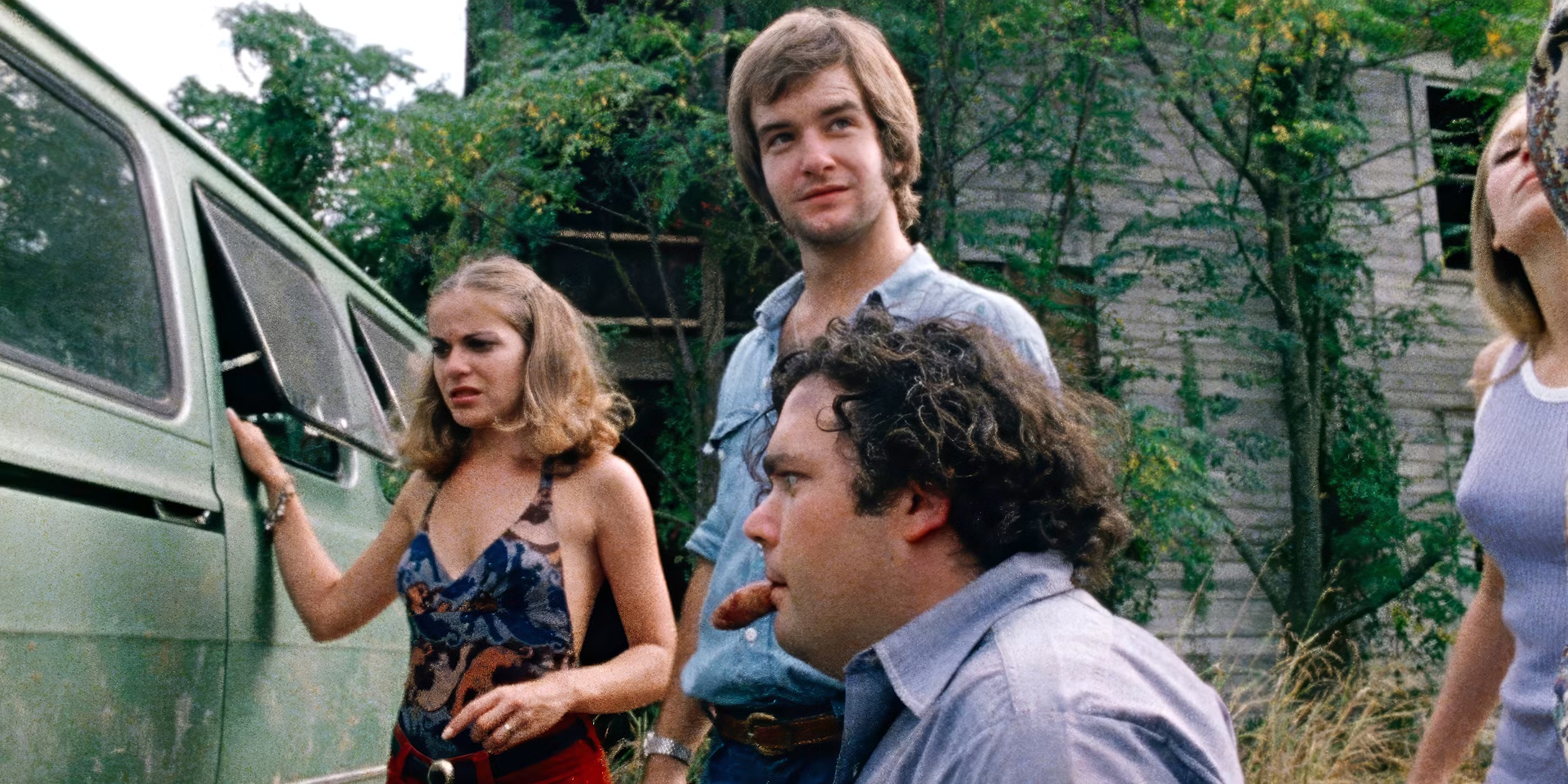

A24 is continuing to build its horror series catalogue. A new report reveals that the indie studio has officially secured the rights to bring the cinematic world of The Texas Chain Saw Massacre to the small screen courtesy of executive producer, Glen Powell, and helmer, JT Mollner (Strange Darling, The Long Walk). Sadly, if you were expecting the Twisters star to be one of the poor unfortunate souls terrorized by Leather Face, we reported back in October that he won’t be starring, but instead will stick to his behind-the-scenes role.
Powell will be joined as an EP by his fellow Barnstorm collaborator, Dan Cohen, Spooky Pictures’ Roy Lee and Steven Schneider, Image Nation’s Ben Ross, Exurbia Films’ Kim Henkel, and Stuart Manashil, with Exurbia’s Ian Henkel and Pat Cassidy producing. With deep ties to the beloved franchise, the former Henkel was a co-writer of the movie that started it all and has since served as a producer on a handful of the many installments that followed. In addition to the A24 series, the folks at ImageNation are also backing a new Texas Chainsaw Massacre feature, but Mollner has been clear that he won’t be involved with the project in any way.
In a statement paired with the incredibly exciting news, Powell said,
“The Texas Chain Saw Massacre is one of my favorite films. It defined a generation of horror films and over half a century after its release, it remains one of the definitive movies of my home state. I’m honored to have Barnstorm help bring in a new chapter for such an iconic title and franchise. With a marquee home in A24 and visionary filmmaker with JT Mollner, alongside our top shelf producing partners, I couldn’t have dreamed of a better team for such a dream property.”
What Other Horror Icons Is A24 Bringing Back?
Over the last several years, A24 has brought audiences several modern horror masterpieces, including Ari Aster’s Hereditary, Danny and Michael Philippou’s Talk to Me, Rose Glass’s Saint Maud, and Jane Schoenbrun’s I Saw the TV Glow. While they continue their cinematic genre takeover, the studio has continued to grow their slate as they reach into the episodic world. In addition to the new Texas Chain Saw Massacre series, they’ve also got their irons in the fire for a Friday the 13th prequel series. Hailing from Brad Caleb Kane, the project, titled Crystal Lake, will focus on the younger years of Jason Voorhees’ (Callum Vinson) life, with Linda Cardellini in the leading role as his over-protective mother, Pamela Voorhees.
Stay tuned to Collider for more updates surrounding Powell and Mollner’s Texas Chain Saw Massacre series.
Entertainment
90 Day Fiance: Emma’s Got Ziad in the Palm of Her Hand – Before The 90 Days Recap [S08E09]

On 90 Day Fiance, Emma Perry gets what she wants from Ziad Yahyaoui and sizes him up as average in a conversation with producers. Daniel recoils when Lisa takes off her wig. Rick Van Vactor confesses his dalliance in Colombia and devastates Trish. And Jovon Fox and Annalyn Fox make up over a poolside breakfast. Let’s dig in a little deeper in this recap of Season 8, Episode 9 Initial Descent.
90 Day Fiance: Emma Perry Sizes up Ziad
Emma Perry is fed up with Ziad Yahyaoui’s lack of enthusiasm on 90 Day Fiancé. She lays out all his romantic texts online. And wants to know why it all came to a screeching halt. He’s been rude and even says he’s zero percent sure Emma is wife material. She calls him out and Ziad quietly relents. He admits she’s right and steps up his game immediately with a home cooked meal and lots of compliments.
Emma Perry is happy the next morning. Production quizzes her on her mood change. She admits that her and Ziad Yahyaoui took things all the way in the bedroom. In spite of him previously citing religious reasons not to do so. Emma gives him an average rating when it comes to size. She’s pleased with the endowment. But not overly excited either. Citing that he’s at least a handful. Ziad has plans for a getaway for Emma’s birthday. Including a camel ride.
Of course, Emma Perry is hoping for a proposal on her birthday. She questions if her odds of being wife material have risen on 90 Day Fiancé. Ziad puts it around 7 percent. Citing the fact that marriage is a big deal. And the percentages will grow over time. He admits her approval rating for him being in love is a solid 70 percent. So for now it’s a numbers game for these two.


90 Day Fiance: Daniel Can’t Deal with Lisa’s Natural Look
Lisa is in pain on 90 Day Fiancé. Her wig is stuck to her head. And the heat has turned the glue to bubble gum. She pulls the wig off to reveal a scabby, irritated scalp. She washes her hair and feels better. But she had a hard conversation with her daughter. Admitting that Daniel proposed and she said yes. Her daughter reminds her of trust issues with Daniel. Namely that he’s been talking to other women in America.
Lisa gets a text from Daniel summoning her to the hotel lobby. Lisa walks up with no wig and he looks like he’s seen a ghost. He wants to know why she is like that. She explains the wig was melting into her head and causing pain. But Daniel has no empathy. Suggesting she should stay inside unless she’s wearing it. He calls her look embarrassing to producers. Lisa is hurt and he does offer a hug but she can tell he’s pulling back.
Lisa wants to cry. But obliges Daniel by donning the wig to meet his friends at a bar on Before The 90 Days. Daniel is dressed sharp, and his pals credit Lisa for saving him and being an angel. By giving him money to dress nice. Lisa doesn’t like them implying she’s a sugar mama. And grills them about the other woman Daniel was talking to who reached out to Lisa. She wants to know if he’s a scammer. But his bros have his back.
Before The 90 Days: Trish Gutted by Rick’s Confession
Rick Van Vactor pulls out all the stops for Trish. He’s rented a beautiful private villa in Nosy Be for them to enjoy. Trish is amazed on 90 Day Fiancé. The views are breathtaking. Until he amps up the cringe by suggesting they role play in jungle costumes. Trish isn’t into it. Suggesting she’d rather be in the buff then in a ridiculous costume. The next morning the pair express their love to each other but Rick is about to throw a curve ball.
He tells Trish in a teary voice that when she stopped talking to him for those five days he up and booked a trip to Colombia and slept with his ex. He gaslights, trying to blame Trish for the transcontinental indiscretion. It turns out Trish did resume communication. But Rick already had the trip booked so he went anyway. Trish isn’t having any of it and doesn’t accept his apologies or attempts to hug her. So, there’s definitely trouble in paradise.
90 Day Fiance: Annalyn Mocks Jovon
Annalyn and Jovon Fox seem to literally be living their own personal Groundhog Day. In spite of being married for three years, They seem bored. And the relationship hasn’t translated well from long distance to in-person. He says she’s unappreciative and nags too much. She says he’s whiny and holds his financial support over her head. They sulk and give each other the silent treatment. But Jovon asks a big question to break the ice.
He wants to know if she regrets marrying him on 90 Day Fiancé. She hesitates but ultimately says no. She complains that he is no fun and imitates him. He laughs and says she is too hard on him. In the end they agree to have a good time. And promise to stop the annoying behaviors that are driving a wedge between them.
TLC Couple Laura and Birkan Discuss His Debt
Laura Nevenner and Birkan head out for a getaway. After admitting he’s 50 grand in debt, Laura is having some doubts. But she still doesn’t know the cause of the debt. And is beginning to question their future. She also thinks he planned the trip as a distraction. They arrive to their seaside destination and do touristy things. But she still plans to get to the bottom of what Birkan and his friends talked about in the cafe.
Birkan actually starts the conversation on 90 Day Fiancé. Laura inquires about the debt. He says at one tine he owned 3 Shisha bars. But when Covid hit he lost everything. And turned to gambling as a way to make money. Laura is visibly annoyed. He admits he used cash from her as a gift to gamble for his rent. Her wheels are turning and she worries about being financially responsible for him if he comes to the US on a K-1 visa. Till next time!
Entertainment
Channing Tatum reveals he's undergone shoulder surgery: 'Another challenge'
:max_bytes(150000):strip_icc():format(jpeg)/Channing-Tatum-020426-1b731977bf664738830686d59daf3c40.jpg)
The “Roofman” actor shared an X-ray of his separated shoulder on social media.
Entertainment
Netflix's Better Version of 'Bosch' Confirms Spin-Off Plans


Netflix has a plethora of long-running shows with large audiences, and more are released every weekend. One of the streamer’s first big hits was Stranger Things, which began in 2016 and didn’t wrap up until last month with an explosive and emotional finale. Netflix has plenty of shows like Stranger Things with massive stakes set in the sci-fi and fantasy genres, but it also has more grounded shows that have picked up large fan bases. The streamer is no stranger to medical dramas and police procedurals, and while these shows don’t always make it off the ground, there is a legal thriller that’s become one of the streamer’s biggest sensations.
Entertainment
Christian McCaffrey On Childhood Bond That Shaped His NFL Path
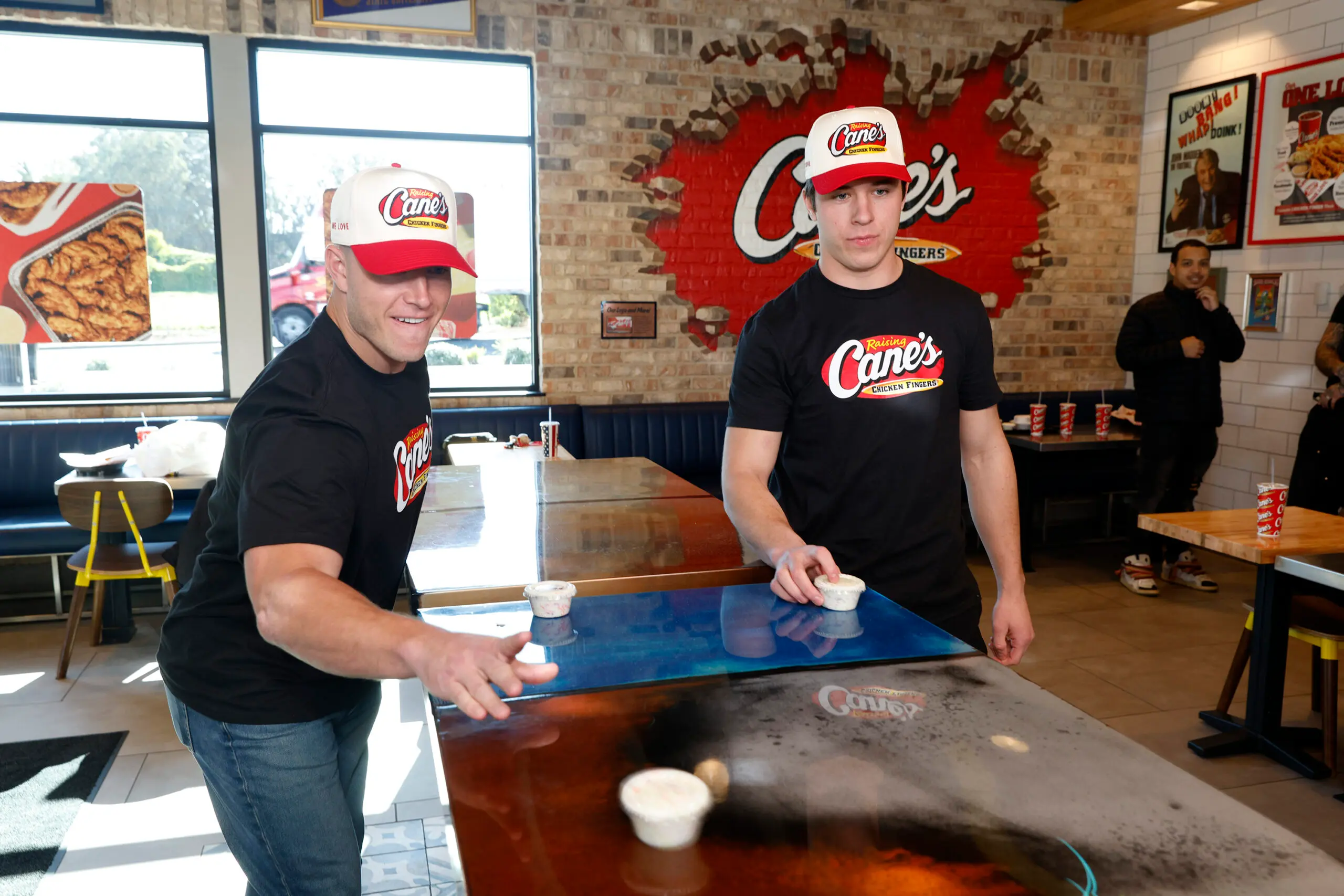
Ahead of Pro Bowl Week, and with even bigger NFL moments on the horizon, Christian McCaffrey and his younger brother, Luke McCaffrey, took a rare pause from the grind to reflect on the foundation that shaped them long before the league. On Monday, February 2, in Colma, CA, the brothers clocked in together at Raising Cane’s for a brother-versus-brother “Raising Cane’s Challenge,” greeting fans, serving Box Combos, and going head-to-head in playful competitions. But once the cameras slowed, the conversation turned deeply personal, centering on brotherhood, childhood competition, and the role models who shaped their journey.
Article continues below advertisement
Christian McCaffrey Says Sharing The NFL Journey With His Brother Is ‘Such A Blessing’

For Christian, who will headline the 2026 Pro Bowl Games in San Francisco ahead of Super Bowl LX, the moment felt surreal, not because of the spotlight, but because he was sharing it with his brother.
Christian said that growing up, playing in the NFL was always the dream, and now, being able to share that journey with his brother, training together and navigating the league side by side, feels especially meaningful.
“We look back on our childhood all the time,” Christian said at the press conference, where The Blast was in attendance. “Everything we did, we did together.”
Article continues below advertisement
Thinking back to the goals he had in mind, CMC told press, “I just wanted to make it to the NFL, and now I have a brother playing at the same time, being able to train with him and do all those things in the offseason together and kind of talk the same talk and be in the same boat, it’s such a blessing.”
Article continues below advertisement
Christian And Luke McCaffrey On How Competing Together Pushed Them Forward
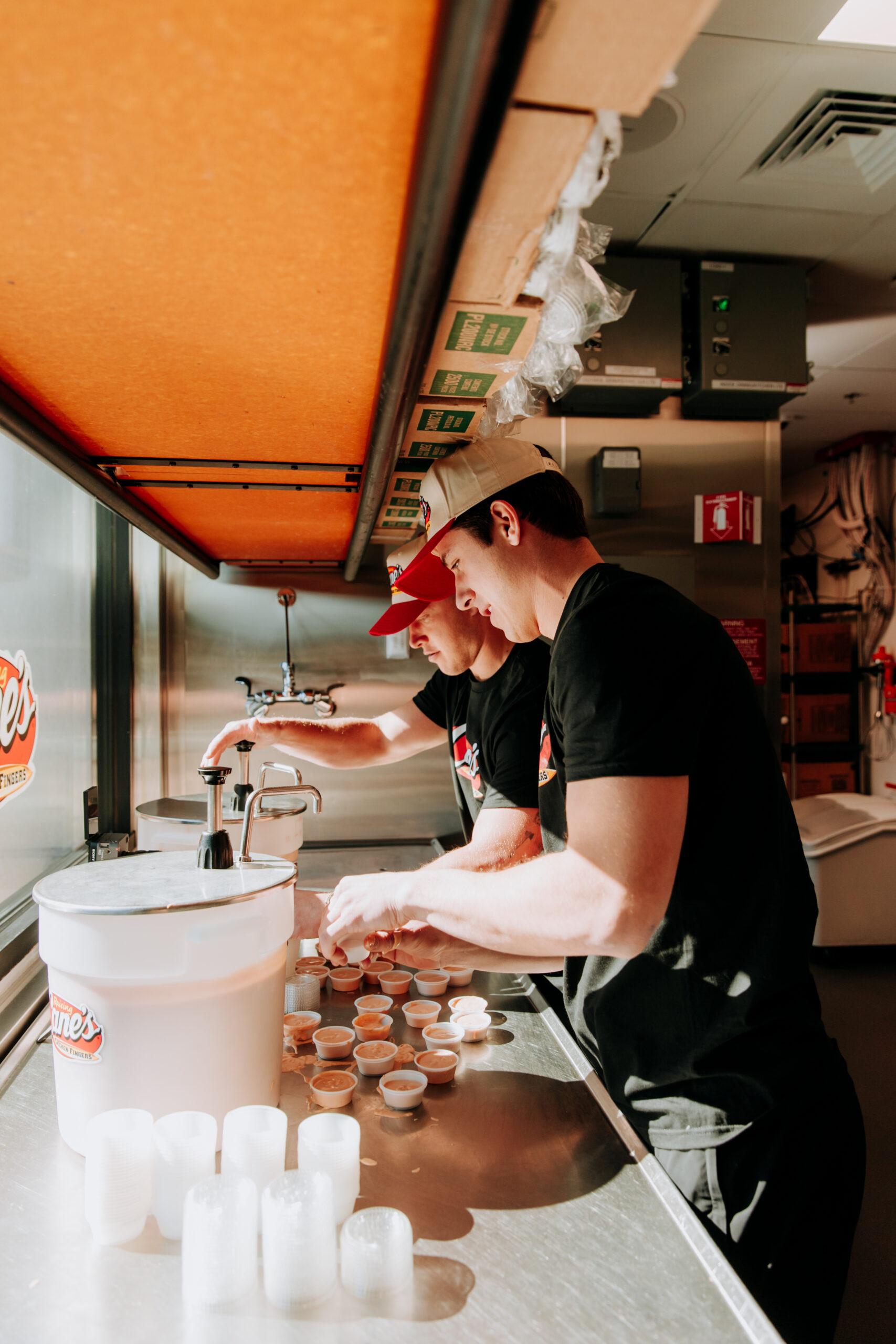
That constant competition, both brothers agreed, was the engine behind their success. “Not a little, there’s a lot,” Christian said when asked if rivalry still exists. “That’s all we ever did was compete. If there was snow outside, it was snow football. If not, it was indoor basketball, whatever it was, we were competing.”
Now, with both playing at the NFL level, that competitive edge hasn’t disappeared. It’s just evolved. “Every time you compete, you probably learn a little bit about yourself and learn a little bit about each other,” Christian explained. “A lot of people don’t have that at this stage, and we do. That piece in your life is so special.”
Article continues below advertisement
Luke echoed the sentiment, calling their current reality something they once only imagined. “We grew up kind of pretending to do this,” he said. “Playing in the NFL, going against each other. It’s cool when you get here and realize you never got to stop doing that, you kind of kept it alive.”
Article continues below advertisement
How A Shared Football IQ Keeps The McCaffrey Brothers Connected
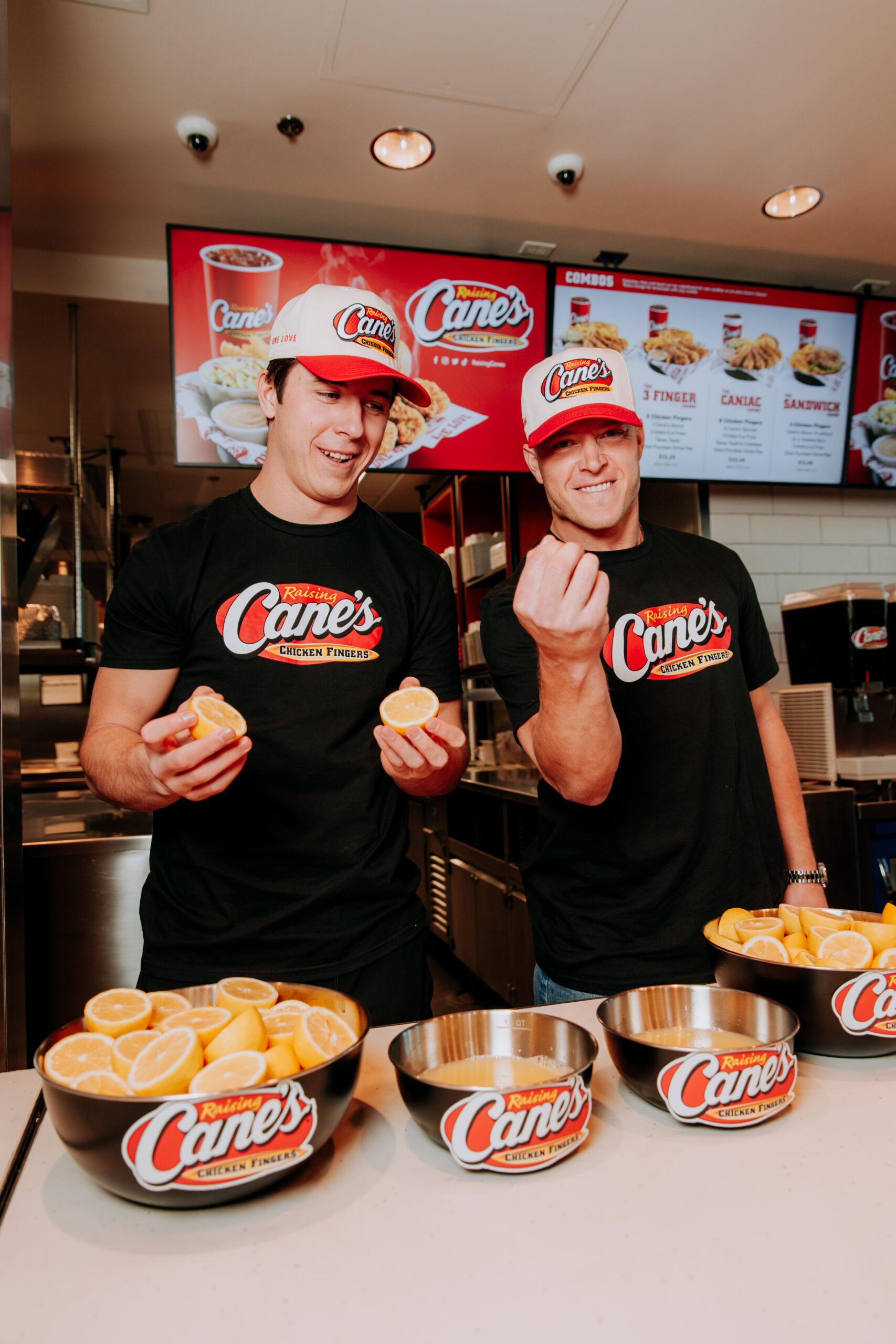
Despite playing different positions, the brothers continue to push each other forward. “He plays receiver,” Christian said. “I run routes out of the backfield, do all these different things. I take a lot from him. He’s an unbelievable receiver. I’m always watching, trying to pick up things that he does.”
That exchange goes both ways, rooted in mutual respect and a shared football IQ shaped by years of backyard battles and family drills. “That’s what makes it fun,” Christian added. “There’s such a healthy competition.”
Christian McCaffrey On The Discipline Behind His Longevity
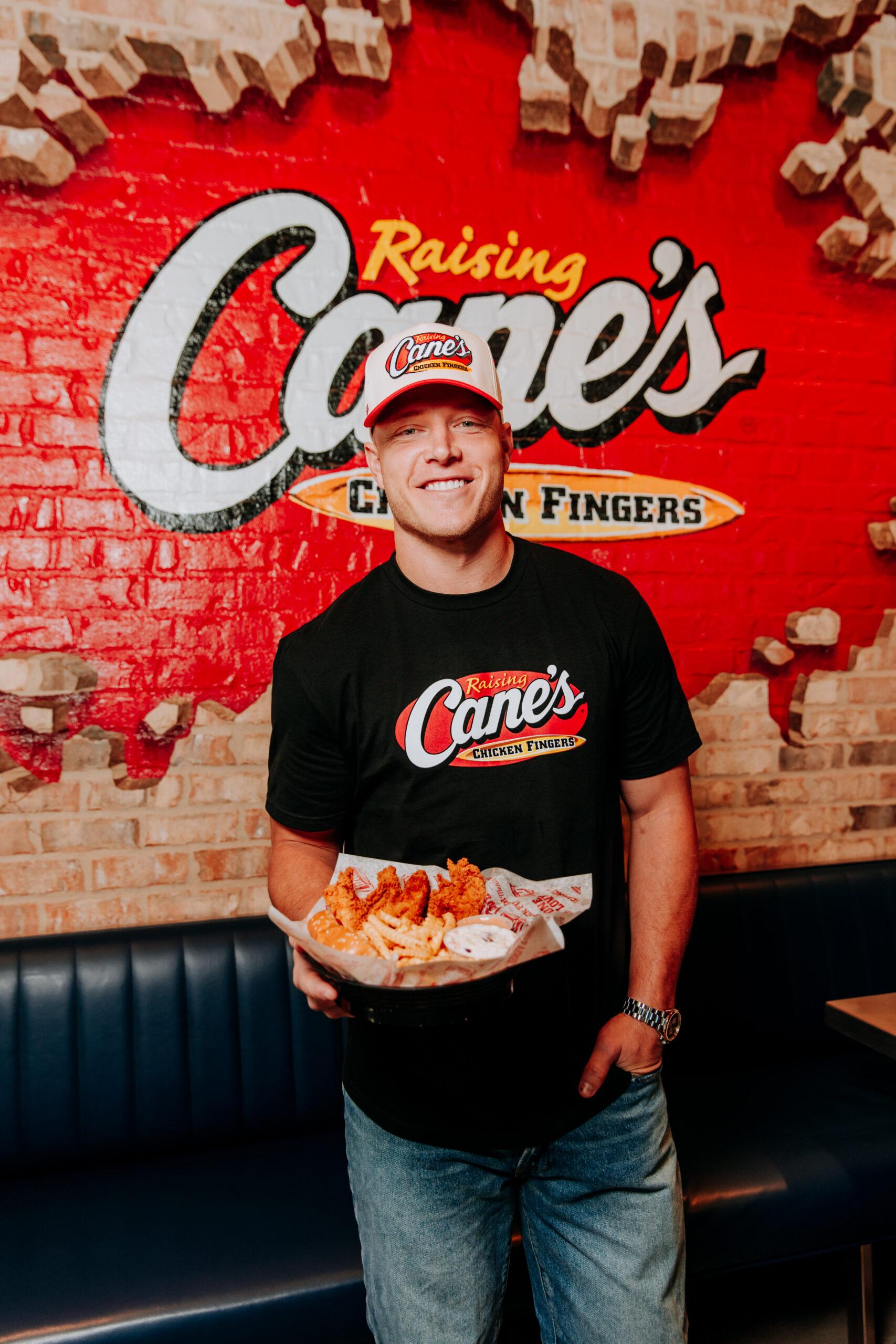
That same discipline and competitiveness carry into the way Christian McCaffrey approaches his body and longevity. Across the 2025 season, including the playoffs, McCaffrey logged 450 total touches while helping power a 49ers team to 13 wins. It marked the third time in his nine-year NFL career that he crossed the 400-touch threshold, a reflection of the rigorous training, recovery, and maintenance that allows him to sustain it.
Article continues below advertisement
That approach extends beyond traditional football prep, with McCaffrey constantly evaluating anything that could impact his health or performance, even conversations around emerging factors like EMF exposure. “As somebody who obsesses over my body and being healthy all the time, I look into everything, and that’s definitely something you’ll look into,” McCaffrey told the San Francisco Chronicle ahead of the Pro Bowl.
He added, “If it is something that can affect you, it’s worth looking into and seeing how to maybe combat it … I’ll look into the way I train, where I train, how I train, when I train, what shoes you wear, your equipment, that can have an effect on things. Your sleep schedule can have an effect on things. What you eat at night. All these things, you’re fighting for the 0.1% of betterment.”
Article continues below advertisement
Pro Bowl Spotlight Awaits In San Francisco
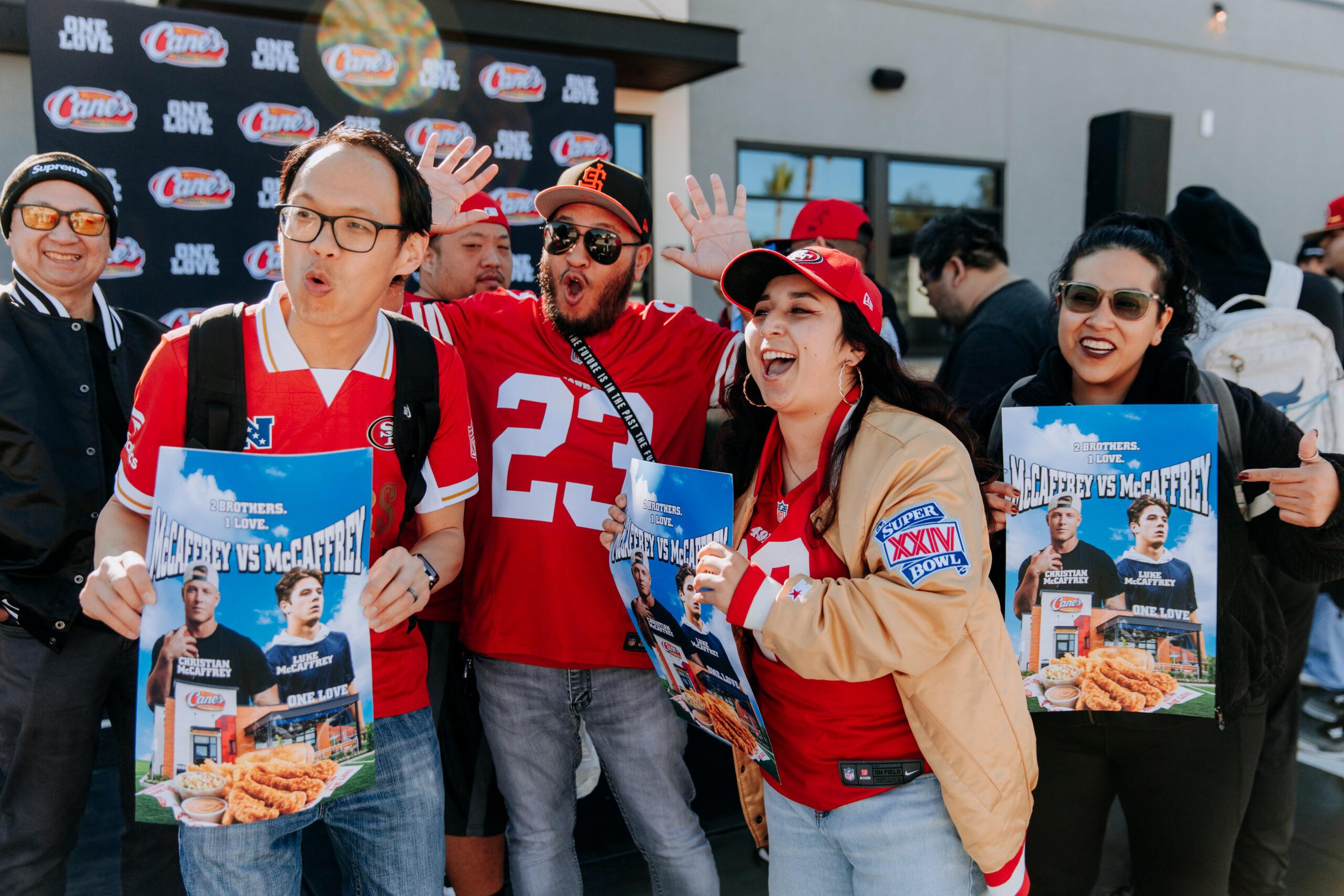
As Christian’s NFL journey continues to reach new milestones, the spotlight will shine even brighter at the Pro Bowl Games, where the league’s top players, including CMC, are set to compete in an AFC vs. NFC flag football showdown in San Francisco, the host city for Super Bowl LX.
The Pro Bowl Games will kick off at 8:15 pm EST on Tuesday, February 3.
Entertainment
‘RHOSLC’ Star Bronwyn Newport Reportedly Dating Famous Model

In December 2025, it was announced that “Real Housewives of Salt Lake City” star Bronwyn Newport and her husband, Todd Bradley, were separated. Since then, she has said they hope to reconcile and are still sharing their Utah home. However, it’s now being reported that the “RHOSLC” star has moved on and is now dating a well-known model.
Newport has reportedly begun dating following her separation from Bradley.
Article continues below advertisement
Reports Say Bronwyn Newport Has Moved On With Someone New

PEOPLE exclusively learned that Newport is dating 32-year-old model Brandon Good. This comes months after it was announced that she and Bradley were no longer together. An insider told the outlet, “They’ve been seeing each other for a few weeks. It’s new, but they’re enjoying getting to know one another. Bronwyn’s really happy.”
The two went out publicly together on February 2 to see Chicago on Broadway, in which “Secret Lives of Mormon Wives” star Whitney Leavitt is currently appearing as Roxi Hart. The outlet reports that Good posted a photo of himself and Newport on Instagram Stories after the Broadway show, captioned, “Date night, Chicago Broadway opening.” They were also seen at the after-party.
Article continues below advertisement
The ‘RHOSLC’ Star Confirmed Her Separation In December

Newport had been open on “The Real Housewives of Salt Lake City” about the problems in her marriage to Bradley. Because of this, fans of the show weren’t shocked in December 2025 when PEOPLE reported that they were no longer together. A representative for Newport confirmed the news with the outlet.
They said that “after thoughtful consideration, Bronwyn Newport and Todd Bradley have separated. This was a mutual decision made with care and respect for one another. They ask for privacy during this time.”
Article continues below advertisement
The confirmation came after Newport discussed her marriage on the show. She said during season six, “The real truth is that my relationship is just as hard as everybody else’s in its own ways and has had its very low lows that were very hard for me. This is a side of me that these ladies haven’t yet seen, but I want them to understand that I bleed the same way that they all do. I cry about things, and that side of me is there if they’re open to it.”
Article continues below advertisement
Fans Are Reacting To Newport Dating Someone New

Fans of “The Real Housewives of Salt Lake City” are sharing their opinions on Newport’s alleged new romance. For the most part, social media users seem to support the lifestyle change for the reality TV star. One person on X said, “Good for her, must be a nice change to date a younger guy as opposed to the old one she married. It’s not surprising she was hoping Todd would agree to an ‘open’ marriage.”
Someone else mentioned rumors from “RHOSLC,” saying, “LMFAO after his farting while he makes out rumors, she headed straight to a young hot guy… ” Another person wrote, “When she said she was willing to open her mind to an open relationship, this is why. She was plotting. “
Finally, a different X user said, “I cry about things, and that side of me is there if they’re open to it.”
Article continues below advertisement
The Reality Star Recently Spoke About Her Separation
Newport opened up in January 2026 about her separation from Bradley in an interview with PEOPLE, revealing that they’re still sharing their home. She said, “We might be the only people in the world who don’t have young children who are nesting. But we’re doing it for our dogs.” Notably, the estranged couple shares four dogs, all boxers.
Regarding the decision to separate from Bradley, she stated that it came after she went to BravoCon 2025 without him. According to her, “It was maybe the first time that I felt like if he wasn’t [in my life], I was going to be okay. It was just this pressure point of trying to explain this life that I was living to him when he was not there, and he wasn’t understanding it.”
She added that after they talked, she “felt okay and happy and fine and like there were things for me in the future.”
Article continues below advertisement
The ‘RHOSLC’ Star Recently Opened Up About Season 7 Casting
Season six of “The Real Housewives of Salt Lake City” ended in January 2026. Now, fans are making their guesses regarding which of the ladies will return for season seven. Newport appeared on Peacock’s Reality Hot Seat NFL Crossover in December 2025 and revealed who she would cut from the series.
After being asked for her take, she said, “I would say going into next season, I might bench Meredith. I think we just saw more from everybody else this season, like personal, home life, I like that.”
Entertainment
Talks Chrisean Jr. In Blueface Response (Vid)

NLE Choppa has stunned fans after seemingly sharing disheartening words about Blueface‘s son, Chrisean Jr., in his response to the rapper calling him out and telling him to “squabble up.”
RELATED: Golden Retriever Material? Blueface Celebrates His Birthday With THIS Female Rapper In NSFW Video
More On Blueface Telling NLE Choppa To Squabble Up
As The Shade Room previously reported, NLE Choppa recently found himself in headlines two weeks ago. This, when the mother of his eldest child, Mariah, alleged that CPS was called over his care of their daughter, Clover. At the time, NLE alleged that two weeks ago was the first time he had seen his daughter since September 2025. In short, Mariah accused NLE of failing to feed Clover, take her to school, and even implied that she may have suffered sexual abuse while in NLE’s care.
Afterward, NLE shared a few tweets about being done taking the “high road.”
Then, he released a new song called ‘Set The Record Straight,’ calling out Mariah and Marissa Da’Nae, the mother of his son, Chozen.
But Mariah and Da’Nae weren’t the only ones to catch shots in NLE’s songs. Apparently, Blueface noticed that he caught a stray, too.
Then, Blue appeared to send a shot back NLE’s way with a caption shared online.
Ultimately, on Wednesday, February 3, Blueface called NLE out, telling him to “squabble up.”
NLE Choppa Seemingly Shares Disheartening Words About Blueface’s Son Chrisean Jr. In His Response
Later that day, NLE took to his Instagram Story to share now-deleted clips where he suggested that Blueface’s son and either of his sons, Chozen or Icon, lay hands on one another. However, as his speech went on, he seemingly appeared to be speaking about Chrisean Jr., noting that the child may not be able to “hold” his “head up” properly. Additionally, NLE noted that he wouldn’t squabble with Blueface because he believes Blue would benefit from the opportunity and use it to pay off his alleged debts.
Click here to watch the clips NLE shared.
Social Media Weighs In Before NLE Issues Apology
Social media users were left stunned by NLE’s comments and slid into TSR’s comment section with their thoughts.
Instagram user @jadorehindii wrote, “nle cancelled . goodbye sir”
While Instagram user @countrycookin1 added, “At this point, I’m sick of this man. Leave these kids out of this.”
Instagram user @uluvfeby wrote, “This was disrespectful no coming back from this wow smh kids off limits”
While Instagram user @bryttain_ added, “DLE just proved how corny he is bringing up that baby. There’s power in the tongue, be careful how you speak on other people children. Chrisean been trying to give her life to God and now your about to make her crash out on you smh.”
What Do You Think Roomies?
-

 Crypto World5 days ago
Crypto World5 days agoSmart energy pays enters the US market, targeting scalable financial infrastructure
-
Crypto World6 days ago
Software stocks enter bear market on AI disruption fear with ServiceNow plunging 10%
-

 Politics5 days ago
Politics5 days agoWhy is the NHS registering babies as ‘theybies’?
-

 Crypto World6 days ago
Crypto World6 days agoAdam Back says Liquid BTC is collateralized after dashboard problem
-

 Video2 days ago
Video2 days agoWhen Money Enters #motivation #mindset #selfimprovement
-

 Tech9 hours ago
Tech9 hours agoWikipedia volunteers spent years cataloging AI tells. Now there’s a plugin to avoid them.
-

 NewsBeat5 days ago
NewsBeat5 days agoDonald Trump Criticises Keir Starmer Over China Discussions
-

 Politics2 days ago
Politics2 days agoSky News Presenter Criticises Lord Mandelson As Greedy And Duplicitous
-

 Fashion5 days ago
Fashion5 days agoWeekend Open Thread – Corporette.com
-

 Crypto World4 days ago
Crypto World4 days agoU.S. government enters partial shutdown, here’s how it impacts bitcoin and ether
-

 Sports4 days ago
Sports4 days agoSinner battles Australian Open heat to enter last 16, injured Osaka pulls out
-

 Crypto World4 days ago
Crypto World4 days agoBitcoin Drops Below $80K, But New Buyers are Entering the Market
-

 Crypto World2 days ago
Crypto World2 days agoMarket Analysis: GBP/USD Retreats From Highs As EUR/GBP Enters Holding Pattern
-

 Crypto World5 days ago
Crypto World5 days agoKuCoin CEO on MiCA, Europe entering new era of compliance
-
Business5 days ago
Entergy declares quarterly dividend of $0.64 per share
-

 Sports2 days ago
Sports2 days agoShannon Birchard enters Canadian curling history with sixth Scotties title
-

 NewsBeat1 day ago
NewsBeat1 day agoUS-brokered Russia-Ukraine talks are resuming this week
-

 NewsBeat2 days ago
NewsBeat2 days agoGAME to close all standalone stores in the UK after it enters administration
-

 Crypto World18 hours ago
Crypto World18 hours agoRussia’s Largest Bitcoin Miner BitRiver Enters Bankruptcy Proceedings: Report
-

 Crypto World6 days ago
Crypto World6 days agoWhy AI Agents Will Replace DeFi Dashboards








